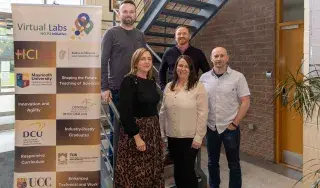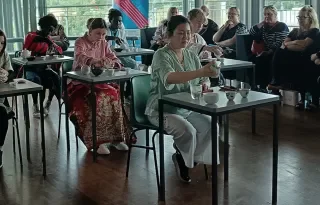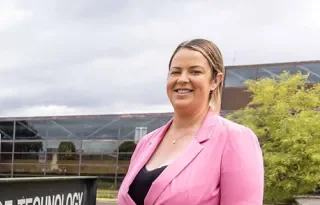Recent study highlights the positive impact of DkIT Virtual Laboratories project on student learning
- Over 600 students have used virtual lab resources since 2021
- Study finds DkIT students found virtual labs improved their confidence and offered valuable flexibility to revisit key concepts and techniques
The DkIT Virtual Laboratories project has published its first peer-reviewed study on using virtual labs and digital learning resources as part of a multi-institutional collaboration with Maynooth University, Dublin City University, University College Cork, and Technological University of The Shannon. Funded by the Human Capital Initiative (Pillar 3), the project is designed to complement and support DkIT science students’ laboratory-based, practical learning by providing them with access to a suite of interactive and engaging virtual simulation learning activities.

Over the last four years, The Virtual Lab team at DkIT has been delivering and assessing virtual laboratory simulations, virtual notebooks and use of digital hardware in classrooms to enhance practical and transversal skills in life science students. In collaboration with students and Enterprise partners in the Biopharmaceutical and Pharmaceutical sectors, the virtual laboratory team have used virtual lab resources with more than 600 undergraduate students across a range of BSc programmes since 2021.
The DkIT team conducted a long-term study on how virtual labs affect students' skills, knowledge, and flexibility, resulting in valuable insights on how to use these resources to improve student success in practical settings. The findings, titled ‘Virtual laboratories complement but should not replace face-to-face classes: Perceptions of life science students at Dundalk Institute of Technology, Ireland’ are now published in the international peer-reviewed journal Advances in Physiology Education.
Senior author of the study and DkIT VL Co-Academic Lead, Dr. Bernard Drumm said:
“This study represents the largest and most systematic analysis of student perceptions of life science virtual laboratories ever conducted in Ireland. Our findings provide student centred feedback on the potential benefits and challenges of using virtual laboratories to enhance life science learning and has wide implications for how these resources might be best utilized in other institutions in the future.”
The study shows that DkIT students felt using virtual labs as pre-lab exercises boosted their confidence in face-to-face practicals and provided valuable flexibility to revisit important concepts and techniques in a safe, non-time limited manner. However, students emphasised the primary focus of practical classes should remain on face-to-face teaching, with the value of peer-learning, instructor guidance and feedback being essential elements for mastering skills in science laboratories.
The conclusions of the study are drawn from survey and focus group analysis of hundreds of students over multiple disciplines since the study began.
The DkIT Data Analysis Lead, and first author of the study, Dr. Caoimhin Griffin (lecturer in the Department of Life & Health Science) said:
“The sheer scale of student responses in this study highlights the invaluable contribution of our students in allowing us to gain a deeper understanding of how virtual laboratories can enhance learning. Our findings suggest that virtual tools work best as a complement to traditional lab instruction - enhancing preparation and reinforcing learning - rather than replacing that essential hands-on experience that our DkIT graduates need, and use, to excel in their postgraduate careers”.
Find out more about the study: https://pubmed.ncbi.nlm.nih.gov/39887303/
About the Virtual Labs Project
The Virtual Labs project focuses on creating a lab-based curriculum that develops transversal skills and is informed by feedback from a broad spectrum of stakeholders including students, staff, and robust partnerships with international edtech firms and regional enterprises from critical sectors such as Pharmaceutical and Biopharmaceutical. The team’s work is designed to meet the demands of modern students embarking on a future career in STEM and enhancing engagement across various educational levels including level 7, 8, and level 9 programmes. The project’s aim is to make an impact on students’ experience of science practical learning.



